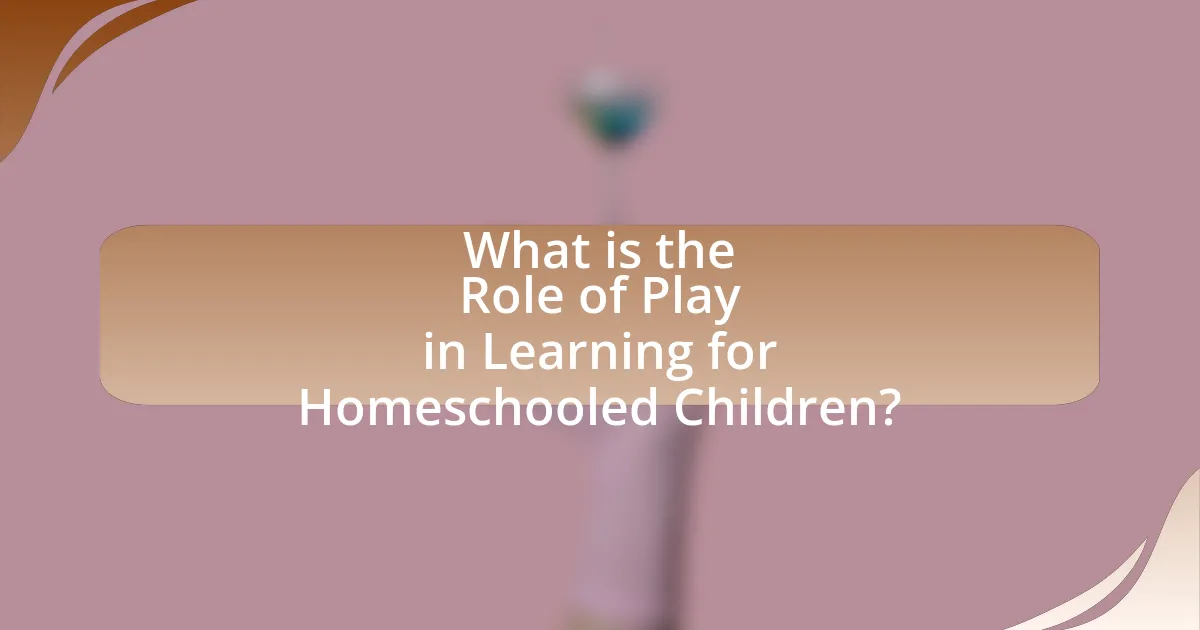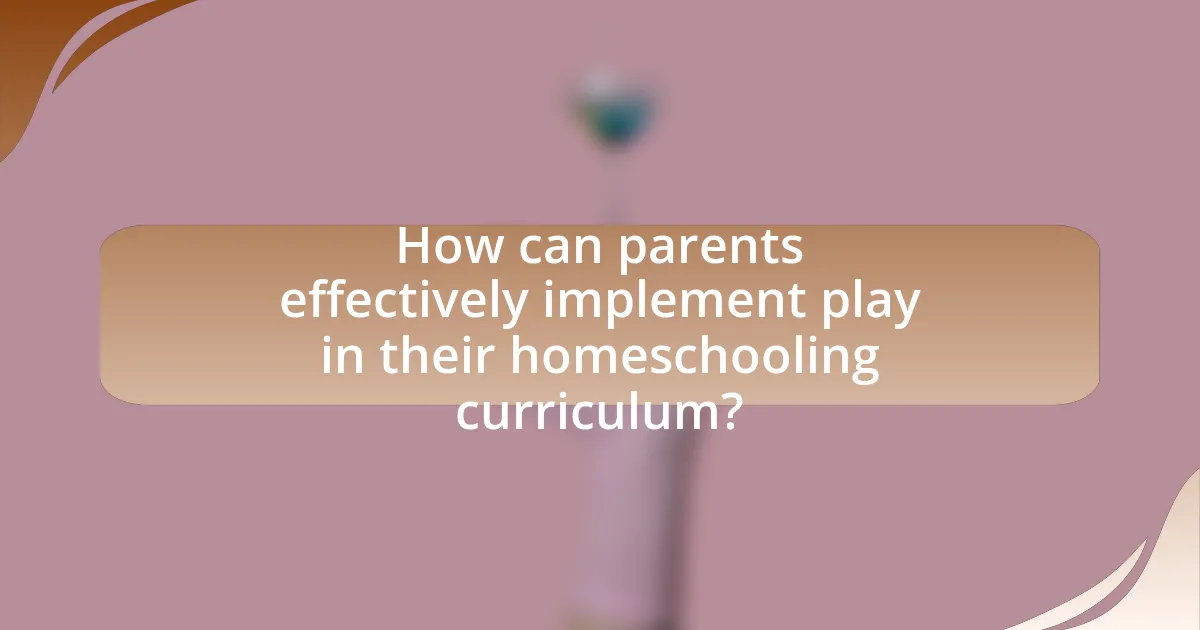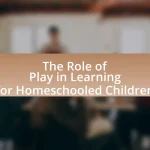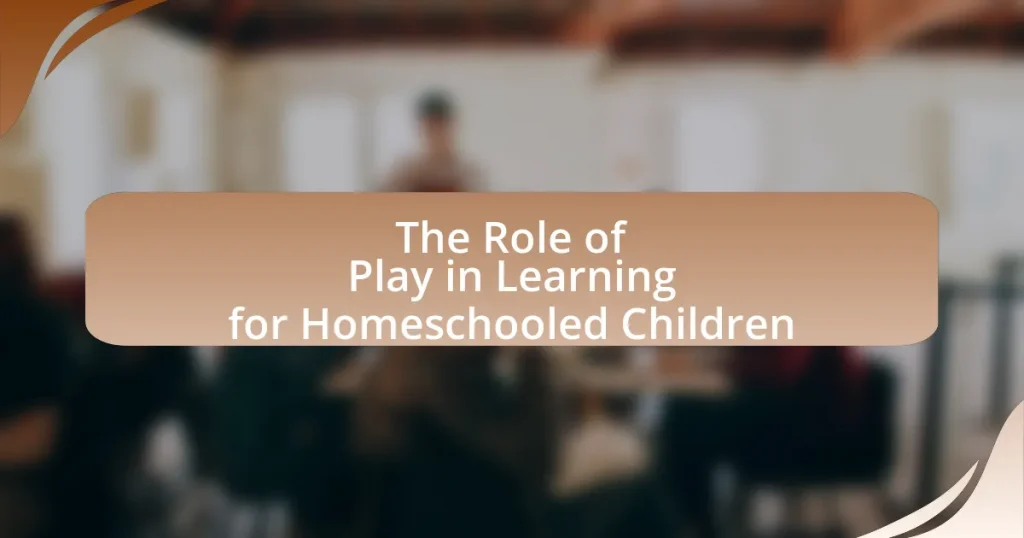The article examines the critical role of play in the learning process for homeschooled children, highlighting its impact on cognitive, social, and emotional development. It discusses how play-based learning enhances engagement, creativity, and problem-solving skills, supported by research indicating improved academic outcomes. Various types of play, such as constructive, imaginative, and rule-based games, are identified as beneficial for learning. The article also addresses the challenges parents face in integrating play into homeschooling and offers strategies to create a conducive learning environment that balances play with academic responsibilities. Additionally, it outlines the psychological benefits of play and provides resources for effective play-based learning at home.

What is the Role of Play in Learning for Homeschooled Children?
Play serves a crucial role in the learning process for homeschooled children by enhancing cognitive, social, and emotional development. Engaging in play allows these children to explore concepts in a hands-on manner, fostering creativity and critical thinking skills. Research indicates that play-based learning can improve problem-solving abilities and increase retention of information, as children are more likely to remember what they have learned through interactive experiences. For instance, a study published in the journal “Child Development” by researchers from the University of California found that children who participated in play-based learning activities demonstrated higher levels of engagement and understanding compared to those who learned through traditional methods. Thus, incorporating play into the homeschooling curriculum not only makes learning enjoyable but also significantly contributes to a child’s overall educational success.
How does play facilitate learning in a homeschooling environment?
Play facilitates learning in a homeschooling environment by promoting engagement, creativity, and critical thinking skills. Engaging in play allows children to explore concepts in a hands-on manner, which enhances their understanding and retention of information. For instance, studies show that children learn better when they are actively involved in the learning process, as play encourages exploration and experimentation. According to research by the American Academy of Pediatrics, play is essential for cognitive development, as it fosters problem-solving abilities and social skills. Thus, incorporating play into homeschooling not only makes learning enjoyable but also significantly enhances educational outcomes.
What types of play are most beneficial for learning?
Types of play that are most beneficial for learning include constructive play, imaginative play, and games with rules. Constructive play, such as building with blocks, enhances problem-solving skills and spatial awareness, as evidenced by research from the American Academy of Pediatrics, which highlights its role in cognitive development. Imaginative play fosters creativity and social skills, supported by studies indicating that children engaged in role-playing scenarios develop better emotional intelligence. Games with rules, like board games, promote critical thinking and strategic planning, as shown in research published in the Journal of Educational Psychology, which found that such games improve mathematical and logical reasoning abilities.
How does play enhance cognitive development in homeschooled children?
Play enhances cognitive development in homeschooled children by promoting critical thinking, problem-solving skills, and creativity. Engaging in play allows children to explore concepts, test hypotheses, and learn through trial and error, which are essential components of cognitive growth. Research indicates that play-based learning can improve executive function skills, such as working memory and cognitive flexibility, which are crucial for academic success. For instance, a study published in the journal “Child Development” by researchers from the University of California found that children who participated in structured play activities demonstrated better cognitive skills compared to those who did not engage in such activities. This evidence supports the notion that play is a vital mechanism for enhancing cognitive development in homeschooled children.
Why is play an essential component of education for homeschooled children?
Play is an essential component of education for homeschooled children because it fosters cognitive, social, and emotional development. Engaging in play allows children to explore concepts, develop problem-solving skills, and enhance creativity, which are crucial for effective learning. Research indicates that play-based learning can improve academic outcomes; for instance, a study published in the journal “Child Development” found that children who participated in play-based activities showed greater gains in literacy and math skills compared to those who did not. Additionally, play promotes social interaction and collaboration, helping homeschooled children build relationships and develop communication skills, which are vital for their overall growth and integration into society.
What are the psychological benefits of play in learning?
Play in learning provides significant psychological benefits, including enhanced cognitive development, improved social skills, and increased emotional resilience. Engaging in play stimulates brain development by fostering creativity and problem-solving abilities, which are crucial for academic success. Research indicates that children who participate in play-based learning exhibit better social interactions and communication skills, as they learn to negotiate, collaborate, and empathize with peers. Furthermore, play helps children manage stress and develop coping mechanisms, contributing to greater emotional well-being. Studies, such as those conducted by the American Academy of Pediatrics, emphasize that play is essential for healthy brain development and overall psychological health in children.
How does play support social skills development in homeschooled children?
Play supports social skills development in homeschooled children by providing opportunities for interaction, communication, and collaboration with peers. Engaging in play allows these children to practice essential social behaviors such as sharing, taking turns, and resolving conflicts. Research indicates that children learn to navigate social dynamics through play, which enhances their ability to form relationships and understand social cues. For instance, a study published in the journal “Child Development” by researchers from the University of Illinois found that children who engage in cooperative play demonstrate improved social competence and empathy. This evidence underscores the critical role that play has in fostering social skills among homeschooled children.
What challenges do parents face in incorporating play into homeschooling?
Parents face several challenges in incorporating play into homeschooling, primarily due to limited resources, time constraints, and balancing educational goals with play activities. Limited resources can include a lack of access to play materials or structured play environments, which can hinder the ability to facilitate effective play-based learning. Time constraints arise from the need to cover a comprehensive curriculum, often leaving little room for unstructured play. Additionally, parents may struggle to find the right balance between educational objectives and the benefits of play, as they may feel pressured to prioritize academic outcomes over play experiences. Research indicates that play is essential for cognitive and social development, yet parents often find it difficult to integrate play meaningfully into their homeschooling routines.
How can parents overcome obstacles to integrating play in learning?
Parents can overcome obstacles to integrating play in learning by creating a structured environment that prioritizes play-based activities alongside academic goals. Research indicates that play enhances cognitive development and engagement, making it a vital component of effective learning. For instance, a study published in the journal “Child Development” by researchers from the University of California found that children who engage in play-based learning demonstrate improved problem-solving skills and creativity. By setting specific times for play, incorporating educational games, and allowing for unstructured play, parents can effectively blend learning with play, thus fostering a more holistic educational experience for their homeschooled children.
What resources are available to support play-based learning at home?
Resources available to support play-based learning at home include educational toys, interactive games, and online platforms. Educational toys such as building blocks, puzzles, and art supplies encourage creativity and problem-solving skills. Interactive games, both physical and digital, promote engagement and social interaction, enhancing learning through play. Online platforms like PBS Kids and Khan Academy Kids offer structured play-based learning activities that align with educational standards, providing parents with tools to facilitate learning at home. Research indicates that play-based learning significantly enhances cognitive and social development in children, making these resources effective for homeschooling.

How can parents effectively implement play in their homeschooling curriculum?
Parents can effectively implement play in their homeschooling curriculum by integrating structured and unstructured play activities that align with educational goals. Research indicates that play enhances cognitive, social, and emotional development, making it a vital component of learning. For example, incorporating games that teach math concepts, such as board games that require counting or strategy, can reinforce skills while keeping children engaged. Additionally, outdoor play can promote physical health and creativity, as studies show that children who engage in active play demonstrate improved focus and academic performance. By balancing educational content with playful experiences, parents can create a dynamic learning environment that fosters holistic development.
What strategies can parents use to incorporate play into daily learning?
Parents can incorporate play into daily learning by integrating educational games and hands-on activities into their homeschooling routines. For instance, using board games that promote math skills, such as Monopoly, can enhance numerical understanding while providing an engaging experience. Additionally, parents can create scavenger hunts that require children to solve puzzles or answer questions related to their studies, thereby reinforcing learning through active participation. Research indicates that play-based learning can improve cognitive development and retention of information, as children are more likely to engage with material that is presented in a fun and interactive manner.
How can structured play activities enhance learning outcomes?
Structured play activities enhance learning outcomes by promoting cognitive, social, and emotional development in children. These activities provide a framework that encourages critical thinking, problem-solving, and collaboration among peers. Research indicates that children engaged in structured play demonstrate improved academic performance, as they develop essential skills such as communication and teamwork. For instance, a study published in the journal “Child Development” by researchers from the University of California found that children who participated in structured play showed a 30% increase in math and literacy skills compared to those who did not. This evidence supports the notion that structured play is a vital component of effective learning strategies for homeschooled children.
What role does unstructured play have in a child’s education?
Unstructured play plays a crucial role in a child’s education by fostering creativity, problem-solving skills, and social development. During unstructured play, children engage in self-directed activities that allow them to explore their interests and develop critical thinking. Research indicates that children who participate in unstructured play demonstrate improved cognitive flexibility and enhanced social skills, as they learn to negotiate, collaborate, and resolve conflicts with peers. A study published in the journal “Child Development” found that unstructured play contributes significantly to emotional regulation and resilience, essential components of effective learning.
How can parents assess the impact of play on their child’s learning?
Parents can assess the impact of play on their child’s learning by observing specific developmental milestones and skills that emerge during play activities. For instance, parents can evaluate cognitive growth by noting problem-solving abilities demonstrated in games or creative play, as research indicates that play enhances critical thinking and decision-making skills. Additionally, social skills can be assessed through interactions with peers during cooperative play, which fosters communication and teamwork, essential for emotional intelligence.
Furthermore, parents can utilize structured assessments, such as tracking progress in literacy and numeracy through play-based learning activities, as studies show that play significantly contributes to academic readiness. For example, the National Association for the Education of Young Children highlights that play-based learning correlates with improved language skills and mathematical understanding. By documenting these observations and assessments, parents can gain a clearer picture of how play influences their child’s overall learning and development.
What indicators show that play is benefiting a child’s education?
Indicators that show play is benefiting a child’s education include improved cognitive skills, enhanced social interactions, and increased motivation to learn. Research indicates that children engaged in play-based learning demonstrate better problem-solving abilities and creativity, as evidenced by a study published in the journal “Child Development,” which found that play fosters critical thinking and adaptability. Additionally, play encourages collaboration and communication among peers, leading to stronger social skills, as highlighted in a report by the American Academy of Pediatrics, which emphasizes the importance of play in developing interpersonal relationships. Lastly, children who participate in playful learning environments exhibit higher levels of engagement and enthusiasm for educational activities, reinforcing the connection between play and academic success.
How can parents adjust their approach based on assessment results?
Parents can adjust their approach based on assessment results by identifying specific areas where their child excels or struggles and tailoring their educational strategies accordingly. For instance, if assessments indicate that a child has strong verbal skills but weaker mathematical abilities, parents can incorporate more play-based learning activities that emphasize math concepts, such as using games that involve counting or measuring. Research shows that play enhances cognitive development; therefore, integrating play into learning can address gaps identified in assessments. By focusing on the child’s unique strengths and weaknesses, parents can create a more effective and engaging learning environment that fosters overall growth.

What are the best practices for fostering a play-based learning environment at home?
To foster a play-based learning environment at home, parents should create a dedicated space for play that is safe, accessible, and filled with diverse materials. This environment encourages exploration and creativity, which are essential for effective learning. Research indicates that children learn best through hands-on experiences; for instance, a study published in the journal “Child Development” highlights that play enhances cognitive and social skills in early childhood. Additionally, incorporating open-ended toys, such as building blocks and art supplies, allows children to engage in imaginative play, promoting problem-solving abilities and critical thinking. Regularly scheduled playtime, alongside adult involvement to guide and support, further enriches the learning experience, as evidenced by findings from the “American Journal of Play,” which emphasize the importance of adult interaction in facilitating meaningful play.
How can parents create a conducive space for play-based learning?
Parents can create a conducive space for play-based learning by designing an environment that is safe, engaging, and rich in resources. This involves providing a variety of materials such as blocks, art supplies, and books that stimulate creativity and exploration. Research indicates that children learn best in environments that encourage active participation and hands-on experiences, as highlighted in the National Association for the Education of Young Children’s guidelines, which emphasize the importance of play in cognitive development. Additionally, organizing the space to allow for both individual and collaborative play fosters social skills and problem-solving abilities, further enhancing the learning experience.
What materials and resources are essential for effective play-based learning?
Essential materials and resources for effective play-based learning include open-ended toys, art supplies, books, and natural materials. Open-ended toys, such as building blocks and dolls, encourage creativity and problem-solving, while art supplies like crayons, paints, and clay foster self-expression and fine motor skills. Books provide stories and information that stimulate imagination and language development. Natural materials, such as rocks, leaves, and water, promote exploration and sensory experiences, which are crucial for holistic learning. Research indicates that these resources support cognitive, social, and emotional development in children, making them vital for play-based learning environments.
How can parents balance play with academic responsibilities?
Parents can balance play with academic responsibilities by integrating structured playtime into the daily schedule alongside academic tasks. Research indicates that play enhances cognitive development and retention of information, making it a valuable component of learning. For instance, a study published in the journal “Child Development” found that children who engage in play-based learning demonstrate improved problem-solving skills and creativity, which are essential for academic success. By allocating specific times for both play and study, parents can create a routine that fosters a healthy balance, ensuring that children benefit from both educational and recreational activities.
What tips can parents follow to maximize the benefits of play in learning?
Parents can maximize the benefits of play in learning by creating a structured yet flexible environment that encourages exploration and creativity. This can be achieved by providing a variety of open-ended materials, such as blocks, art supplies, and natural objects, which stimulate imaginative play and problem-solving skills. Research indicates that children learn best through play when they are allowed to make choices and direct their own activities, fostering independence and critical thinking. Additionally, incorporating educational games that align with learning objectives can enhance engagement and retention of knowledge, as evidenced by studies showing that play-based learning improves cognitive development and social skills in children.
How can parents encourage creativity and exploration through play?
Parents can encourage creativity and exploration through play by providing open-ended materials and opportunities for imaginative play. Research indicates that children who engage in unstructured play with diverse resources, such as blocks, art supplies, and natural elements, develop problem-solving skills and innovative thinking. A study published in the journal “Child Development” found that children who participate in creative play demonstrate higher levels of cognitive flexibility and originality. By allowing children to direct their play experiences, parents foster an environment where exploration and creativity thrive.
What common mistakes should parents avoid when integrating play into learning?
Parents should avoid the mistake of treating play as a separate activity from learning. Integrating play into learning requires parents to recognize that play can enhance cognitive development and reinforce educational concepts. For instance, research shows that children learn better when they engage in playful activities that stimulate their imagination and problem-solving skills. Additionally, parents should not impose rigid structures on playtime, as this can stifle creativity and reduce the effectiveness of play as a learning tool. Instead, allowing for open-ended play encourages exploration and discovery, which are essential for effective learning.










